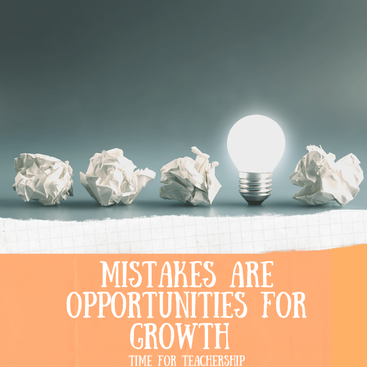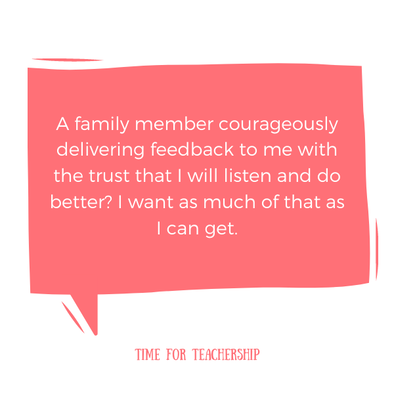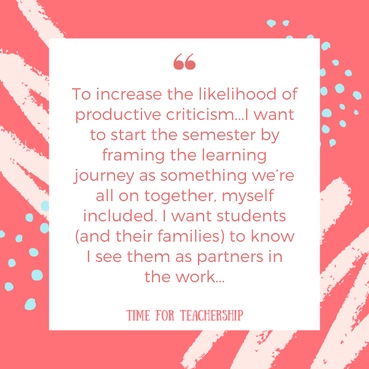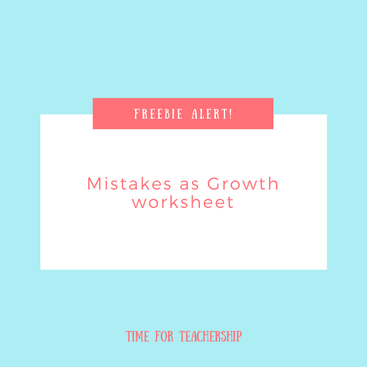|
As a teacher, it was never comfortable making a mistake. Whether I made an assumption about student behavior, answered a question incorrectly, or mispronounced a student name, the guilt and shame of making that mistake hurt. Those feelings of guilt and shame never fully went away, but I became more comfortable with apologizing and seeing the opportunity to recognize my mistakes as a chance for growth. This year, as I have grown my business, I’ve been figuring out how to do the same in a different context. Being in the public eye is not comfortable for me. I’m not a big fan of social media. I’m an introvert whose ideal weekend is reading a book at home on the couch. However, we miss out on a lot when we remain in our comfort zones. This year, I’ve received more critical feedback than ever just by virtue of having a larger audience. While some “feedback” has been unhelpful anger about the goal of educational equity, far more feedback has been immensely helpful critique from this brilliant community of educators. While I’m still working on releasing the feelings of guilt and shame that linger way beyond the day I receive the feedback, I have to say, I am truly grateful for the time educators have taken out of their busy days to share how I could do better. I think about how much courage and energy it takes to read something, feel frustrated by it, and then decide not to discount the author, but actually send an email to share that frustration and give me a chance to do better. I also think about the trust required to take the risk of providing feedback—the belief that the message will be heard, that it will result in change, that it will not result in anger-fueled backlash—and I am profoundly grateful for that trust. I will continue to make mistakes, and I will continue to work on my response to critical feedback. If I cause harm, I want to apologize and also commit to doing better moving forward. (A book that has helped me think about apologies is On Apology by Aaron Lazare.) I will continue to do the work to learn about racial, gender, sexual, and dis/ability justice. I will continue to invite feedback from educators. I also bring all of these commitments into the virtual teaching space as I prepare for the Fall semester. This semester, my class will be fully remote, and so I’ll need to establish that trust and co-construct (with students) a community focused on growth, not perfection. I recognize that building this community at a distance may look different than it did teaching in person, but it is still possible, and it is, perhaps, more important than ever. As many of us learned during Spring 2020, holding class in virtual spaces comes with additional challenges like having family members or others watch you teach. I know many teachers are concerned about students sharing recordings of live classes and being under scrutiny for mistakes made during class. I have no magical solution to this concern. I’ve worked with teachers this summer who have reported such a thing happened to them this spring. However, it makes me think about when I taught high school and we had a standing invitation to any family members or caretakers who wanted to shadow their children in their classes. While this was a bit nerve-wracking, I appreciated the oversight. I wanted that accountability, not as a “Gotcha, you’re fired,” but as a learning opportunity to share feedback like, “You never called on my child when she had her hand raised,” or “My grandson struggled with the assignment and didn’t know how to get help when he needed it.” A family member courageously delivering feedback to me with the trust that I will listen and do better? I want as much of that as I can get. I don’t say this to discount the real fear of recorded classes being misused in harmful ways or to pretend the guilt and shame doesn’t sting, but to help us frame our thinking about how we view productive critique when we make mistakes. To increase the likelihood of productive criticism in my own class this year, I want to start the semester by framing the learning journey as something we’re all on together, myself included. I want students (and their families) to know I see them as partners in the work, and I want to create space for members of the class community to courageously and without fear of reprisal share critical feedback if I made a mistake, omitted a marginalized perspective, or caused harm. I was recently on a webinar in which Dr. Ibram X. Kendi shared a powerful analogy about diagnosing a problem. He said when his doctor diagnosed his GI symptoms as Stage 4 colon cancer, he was immediately resistant. “Not me,” he thought. I don’t drink; I don’t smoke; I work out. Being an antiracist scholar, he drew a parallel to people’s defensiveness in being told their actions were racist. He said it’s the same with the doctor—diagnoses aren’t shared to hurt anyone. Diagnoses are delivered with the intention to heal. I found this analogy incredibly powerful in thinking about the mistakes we make as educators and the mindset required to view critique as opportunities for growth. If it helps to track your growth over time so you can see the benefits of listening to criticism and growing as a result, I’ve made a Mistakes as Growth worksheet for you! Here’s to a new academic year filled with learning, healing, and growth for all of us.
2 Comments
Becky Becker
8/16/2020 08:54:22 am
Lindsay,
Reply
12/9/2022 06:25:00 am
For getting more details click on given link.
Reply
Leave a Reply. |
Details
For transcripts of episodes (and the option to search for terms in transcripts), click here!
Time for Teachership is now a proud member of the...AuthorLindsay Lyons (she/her) is an educational justice coach who works with teachers and school leaders to inspire educational innovation for racial and gender justice, design curricula grounded in student voice, and build capacity for shared leadership. Lindsay taught in NYC public schools, holds a PhD in Leadership and Change, and is the founder of the educational blog and podcast, Time for Teachership. Archives
May 2024
Categories |





 RSS Feed
RSS Feed